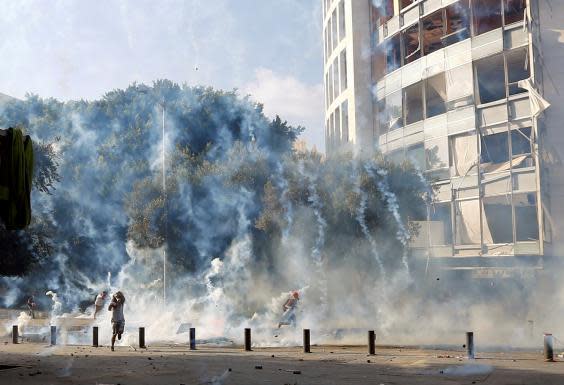Beirut explosions: Protesters storm government buildings as tear gas fired and over 110 wounded

Lebanese protesters stormed government buildings in Beirut and temporarily took over the foreign ministry, as more than 110 people were wounded during mass anti-government demonstrations.
The country's prime minister Hassan Diab also announced late on Saturday that he would introduce a draft bill to parliament to allow early elections.
Shots were heard as riot police fired tear gas at protesters in the capital, who had descended onto the streets in their thousands to demand accountability for the blasts, which killed more than 150 people and wounded a further 6,000.
The Lebanese Red Cross said that more than 110 were wounded and a further 32 taken to hospital. A police spokesperson later confirmed that an officer had been killed after falling down an elevator shaft while being chased by protesters.
Dozens of protesters meanwhile broke into the foreign ministry, where they burnt a framed portrait of President Michel Aoun, a representative for many of a corrupt political class seen to be culpable for both the explosions and the country's deep economic crisis. Security forces later retook control of the building.
Banners reading “Beirut – capital of the revolution” were hung across the front of the building as furious demonstrators chanted “down with the presidents” and “all of them means all of them” – a central slogan to the protest movement. The ministry of environment was also set on fire.
Lebanese citizens had been gathering en masse since Saturday morning, demanding accountability for the blasts that devastated the capital, expecting to leave more than 300,000 homeless.
The exact cause of what is being called the largest non-nuclear blast in modern history, is not known. But Mr Aoun admitted on Friday night that he knew the warehouse which caught fire at Beirut port had dangerous explosives in it. The ignition of 2,700 tonnes of Ammonium nitrate stored poorly in the port is thought to have been the blast.
At Martyrs’ Square protesters hung nooses along a wooden frame that they said were meant for the politicians they accused of destroying the country and “murdering the people many times over”.
Within hours of the rallies erupting security forces had already fired tear gas into the crowds, many of whom were carrying brooms and shovels from the clean up efforts in the surrounding destroyed streets.
“We are all against the government and want to see the politicians hang,” said Ghada Agha, 48, whose advertising business and home were both destroyed in the blast leaving her jobless, penniless and homeless.
Fighting breaks out - so much anger here - tear gas in background #beirut pic.twitter.com/7UZdFUjt0f
— Bel Trew (@Beltrew)
“Our president put us in this and situation – he has killed so many times over, and we cannot survive any more.
“They have destroyed our homes, our businesses they stole our money, our savings, and our future.”
Chanting “revolution!” and for the “downfall of the regime”, many of those gathered said that Lebanon was already on its knees due to an unprecedented financial crisis, that had seen food prices soar and families starve, as well as 20 hour power cuts a day over chronic fuel shortages before Tuesday’s devastating blasts.
Soldiers in vehicles mounted with machine guns patrolled the area amid the clashes.

“Really the army is here? Are you here to shoot us? Join us and we can fight the government together,” a woman yelled.
“Resign or hang,” read another placard.
Among those joining the protesters were many injured in the blast.
Her arm in a sling, Carmen Khoury, 48, a university administrator told The Independent she was pinned under a car from the pressure wave and the woman standing next to her was killed.
“We have the most corrupt government in the world, they have done nothing to protect their people. Even now after the explosion, they have left us to look after ourselves,” she said.
She explained she was part of an activist group that were housing those left homeless by the explosion as well helping clear the debris, as no government initiative had been launched to deal with the crisis.
“I have lived through two wars and this is truly the worst days I have ever had to deal with.”
Additional reporting by Reuters
Read more
Tales of kindness in beleaguered Beirut
Lebanon president admits knowing about explosive stockpile weeks ago
Beirut grandmother plays piano amongst wreckage of home
‘Miracle’ girl found in rubble of Beirut explosion after 24 hours

 Yahoo News
Yahoo News 
